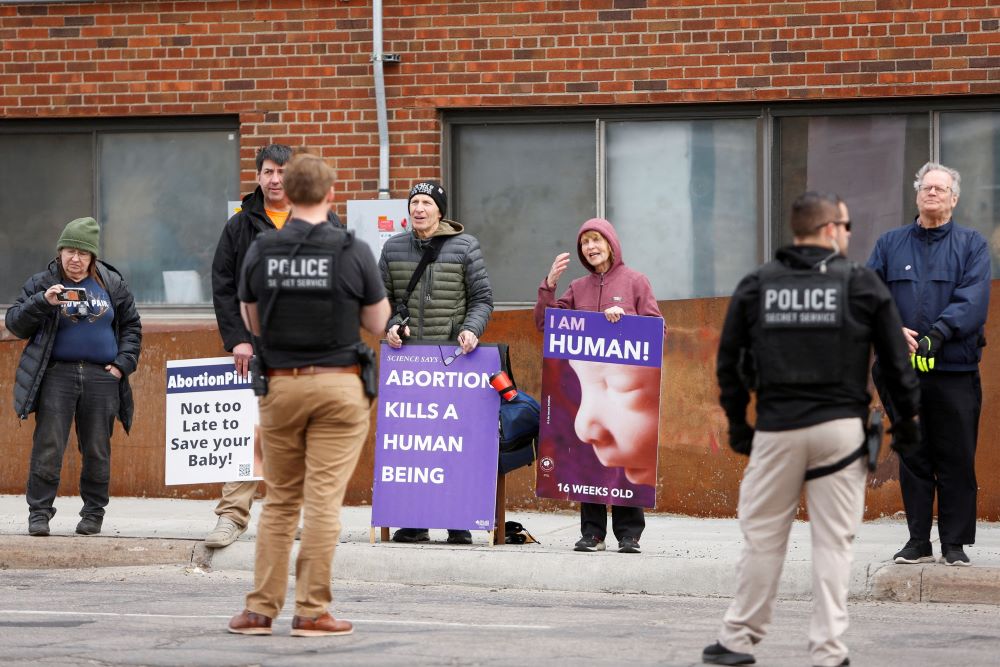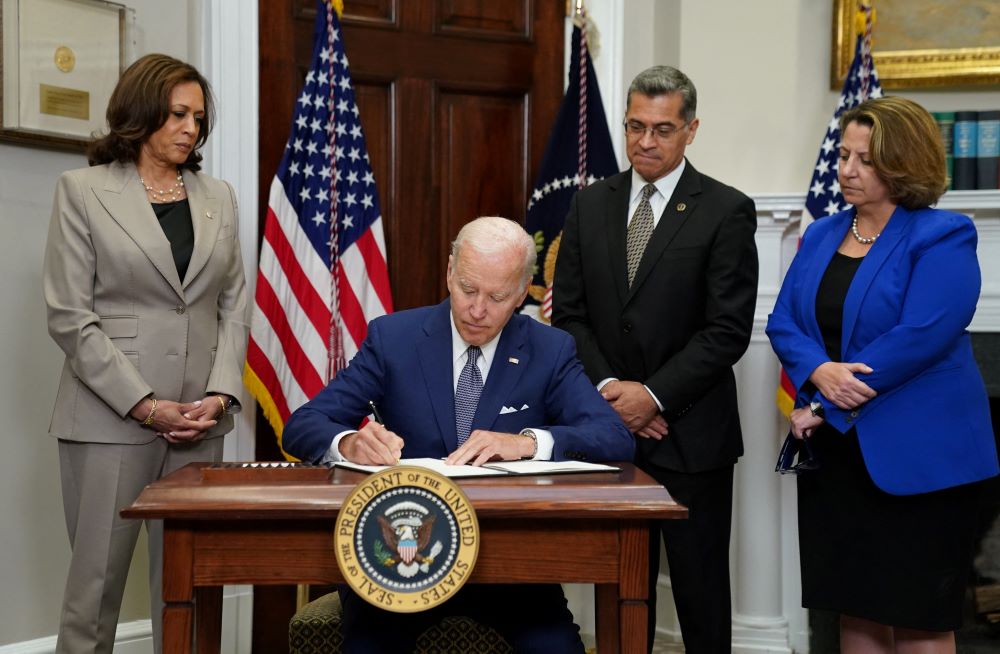
Pro-life supporters demonstrate as U.S. Vice President Kamala Harris visits an abortion clinic in Minneapolis March 14. It was the first time a president or vice president visited an abortion clinic. (OSV News/Reuters/Nicole Neri)
Watching political coverage on MSNBC or CNN the past few weeks, you likely have heard panelists say that abortion had been decisive in helping Democrats win in 2022 and 2023, and predicted the issue would carry Democrats, including President Joe Biden, to victory in 2024. No one else on the panel usually contradicts the assertion. Is it true?
Biden has long been ambivalent about abortion. The word was unmentioned during the virtual convention in 2020. In his State of the Union address, the president again avoided using the word "abortion" but he highlighted his commitment to restoring Roe v. Wade. On a recent visit to an abortion clinic in Minnesota, Vice President Kamala Harris called restrictions on abortion access "immoral."
For some extreme pro-abortion folks, this isn't enough. They take issue with the president's highlighting of stories about abortion access that involve crisis pregnancies. "The president is part and parcel of the culture of stigma and shame that surrounds abortion care," Dr. Jamila Perritt, president and CEO of Physicians for Reproductive Health, told Politico. "Privileging certain stories allows us to 'other' people."
Note to Biden reelection campaign staff: Do not listen to Perritt. She is not the first activist to be clueless about how extreme their positions can be, and how alienating to voters who entertain moral qualms about abortion, who do not like extreme positions either for or against abortion.
What the Biden campaign needs to recognize is that abortion is totemic. For some people it represents all that is wrong about the sexual revolution and its progeny, and they are base GOP voters. For others, the libertarian stance on abortion is the only possible way to recognize women's rights, and they constitute part of the Democratic base. Americans in the center, the people who will decide the election, are not comfortable with either extreme.

President Joe Biden signs an executive order at the White House in Washington July 8, 2022, that he said would help safeguard women's access to abortion and contraceptives. (OSV News/Reuters/Kevin Lamarque)
Biden captured the ambivalence many Americans feel about the issue when he told a group of Democrats at a Maryland fundraiser, "I'm a practicing Catholic. I'm not big on abortion. But guess what? Roe v. Wade got it right." If that language upsets pro-choice activists, what are they going to do? Vote for Donald Trump?
An earlier Politico story looked at the significant role abortion played in the 2022 midterms, stemming what was an expected "red wave" from washing Democrats out of office. Even they had to allow that the effects of the abortion issue were not comprehensive:
How abortion shaped the 2022 midterms is, nevertheless, a mixed portrait of state-by-state results, where some Republican candidates prevailed even with staunch anti-abortion positions, such as in the governor's races in Georgia and Florida, while Democrats in deep-blue New York suffered heavy losses. Yet, in many battleground and red-leaning states and districts, especially where Democrats spent millions to keep it at the forefront for voters, abortion access played an outsized role, reversing the party's once abysmal outlook.
That "nevertheless" is important.
In Ohio, Gov. Mike DeWine signed a "heartbeat bill" in 2019 prohibiting abortion once the unborn child's cardiac activity can be detected, about six weeks into a pregnancy. And on Dec. 22, 2021, he signed a law requiring medical personnel to save a child born alive following an attempted abortion, an exceedingly rare event but one which conservatives highlight to dramatize the moral stakes in the abortion debate.
In 2022, after the Dobbs decision had come down, Democrats thought they had a winning issue, and gubernatorial candidate Nan Whaley highlighted DeWine's anti-abortion position in her campaign. On election night, DeWine won with 63% of the vote to Whaley's 37%.
In 2023, Ohio voters passed a constitutional amendment protecting abortion rights by 57% to 43%. Across the river, in Kentucky, a state that is even more red than Ohio, a referendum on abortion rights was held in 2022, and the pro-choice side won with 53% of the vote. In no state has the pro-life side won when the issue is put to a referendum.
In Texas, Gov. Greg Abbott signed a "heartbeat bill" into law in 2021, and he romped to reelection with 55% of the vote the following year, after Dobbs had struck down Roe.
Texas isn't much of a swing state, but Georgia is. In 2022, Democrats accused Gov. Brian Kemp of rushing to implement the six-week ban he had signed into law in 2019, but it didn't hurt Kemp at the polls. He defeated Democrat Stacey Abrams 53% to 46%, a significantly better margin than that in his pre-Dobbs, 2018 race when he narrowly beat Abrams 50.2% to 48.8%.
Wisconsin is also a swing state and in 2022, Democrat Lt. Gov. Mandela Barnes challenged incumbent Republican Sen. Ron Johnson. Barnes leaned heavily into the abortion issue. Johnson beat Barnes 50.5% to 49.5%.
Advertisement
In other states, such as Michigan and Pennsylvania, it appears abortion played a role in electing Democrats. One mistake the GOP made? They dodged the issue in their advertising, spending only $37 million on abortion ads while the Democrats spent $358 million, according to AdImpact. The result? Six months of lopsided advertising, which makes the issue even harder for Republicans. They made the same mistake Democrats did in 2010, when they refused to defend the unpopular Affordable Care Act. The result? It was even more unpopular and they got shellacked.
If the results of highlighting abortion are so uneven, why are so many consultants and strategists suggesting it will be a silver bullet in 2024? Part of the problem is "privileged college kid syndrome." The young, highly educated people who staff Democratic campaigns are overwhelmingly libertarian in their social values and, just so, out of touch with working class Americans.
The media, too, is afflicted with privileged, highly educated people who are complicit in erasing the humanity of the unborn child. (If the unborn child is the product of IVF, then, and only then, do we call it a baby!) It was remarkable that a recent New York Times article about Trump making inroads among Latinos mentioned Republican efforts to recruit Hispanic evangelicals, but did not mention the fact that Catholic Hispanics are also more conservative than the electorate as a whole when it comes to abortion according to a 2012 Pew Survey. A more recent study by Pew shows pro-choice views growing among Hispanics, but overall, they still lag behind the electorate as a whole.
Part of the problem is the prominent role pro-choice groups like EMILY's List, NARAL Pro-Choice America and Planned Parenthood play in Democratic party fundraising and staffing. EMILY's List recently accepted $200,000 from a group of Republican megadonors, and endorsed a weak candidate in a California Democratic primary, sending off alarm bells about the organization.
Part of the problem is the failure of the pro-life movement to prepare politically for the overturning of Roe. Many of us warned through the years that unless the pro-life movement changed people's hearts, changing the law wouldn't accomplish much. We were more right than we knew.
In any event, Biden should ignore the activists who want him to give a more fulsome defense of libertarian values on abortion. Many of us wish he was more willing to look for a compromise on the issue, one that would limit abortion later in pregnancy. But at least he should continue to signal his own ambivalence about the procedure if not about the law. His position may not pass the test of logic, but it corresponds to the mixed feelings many millions of Americans feel about the issue.








